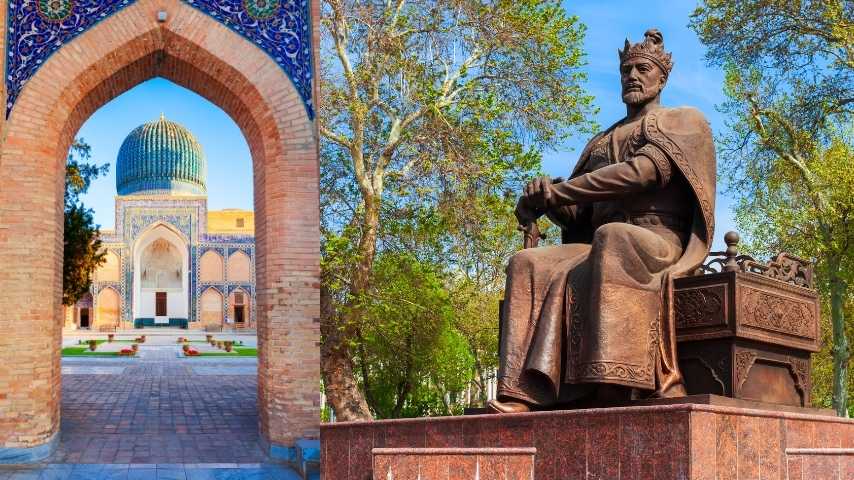Who is Amir Timur?
Timur was a child born in an ordinary village in the depths of the Asian steppes, yet destined for extraordinary fate. That child was none other than Timur, who would establish an empire stretching from China to the shores of the Mediterranean, and from India to the waters of the Rose River. His name was synonymous with a ruler who determined the fate of the stars.

First Steps and Arduous Journeys
Timur was born in 1336 into the Barlas tribe. However, when his life was threatened by the leaders of the region, he had to flee. Alongside his wife and loyal companion Amir Husayn, he struggled to survive in the deserts amidst harsh living conditions. Timur acquired the nickname Tamerlane (Timur the Lame) from the difficult moments he endured.
Rise and Triumphs
Upon returning to Transoxiana, Timur began employing ingenious tactics on the battlefield to exalt his own glory and seize the region. Instilling a sense of siege by having his soldiers light hundreds of campfires around his enemies on nearby hills, Timur augmented his reign of terror by taking control of many cities and expanding his empire.
The Dilemma of Timur’s Power and Tyranny
Timur’s leadership relied on cunning and political acumen. Establishing an advanced intelligence network, he meticulously mapped out the countries he would campaign against and fomented internal strife. However, amid his victories, there were also acts of cruelty. During his campaign in India, Timur massacred hundreds of thousands of civilians, propagating Islam and thwarting the influence of Christian missionaries.
Ruthlessness
Timur had an intriguing obsession with skulls. The events in Isfahan were a testament to his cruelty. Rather than punishing the soldiers who harassed women in Isfahan, he drenched the city in blood. The same ruthlessness was evident in cities like Sivas and Aleppo, where Timur instilled terror by constructing towers from human heads.
Diplomacy and Strategy
Timur was not only a warrior leader but also renowned for his diplomatic prowess. While attempting to establish friendship and trust with the Ottoman Empire, war became inevitable due to the pressure from Yıldırım Bayezid. In the Battle of Ankara, Timur defeated the Ottomans and captured Sultan Yıldırım Bayezid.
Amir Timur’s Influence
Timur’s legacy is shaped not only by military victories but also by cultural and political impacts. Under his rule, Samarkand experienced a golden age of art and science. By attracting artists and scholars to the city, Timur fostered cultural vibrancy and transformed Samarkand into one of the world’s esteemed centers.
Continuing Genghis Khan’s Legacy
Timur was determined to continue Genghis Khan’s legacy. His armies consisted of Mongol and Turkmen tribes, and he adopted Genghis Khan’s military strategies. However, Timur sought to preserve this legacy not only on the battlefield but also in arts and sciences.
Dream of Empire and World Domination
Timur’s goal was not merely to be a regional power but to dominate the entire world. The empire established under his leadership left a significant mark on world history. However, this dream came to an end with his death. The empire he left behind played a crucial role in shaping subsequent states like the Ottoman Empire and others.
Between Respect and Hatred: The Significance of Timur
Throughout history, Timur has been remembered with both respect and hatred. His cruelty and tyranny have left a dark stain in the eyes of many. However, Timur’s strategic genius and cultural legacy have also garnered great admiration. His story offers a profound insight into the complex nature of humanity and different aspects of leadership.
The Story of an Unforgettable Ruler
The story of Timur is an epic often recounted in history books. He is an unforgettable wolf of the Asian steppes, and his legacy has left a profound impact on world history. Under his leadership, the empire he established influenced not only military victories but also art, science, and culture. Timur’s story serves as an inspiring source for anyone seeking to understand the complexities of humanity’s history and leadership principles.
The Continuation and Debates of His Legacy
Timur’s legacy remains a subject of debate to this day. While some accuse him of barbarism, others emphasize his strategic genius and cultural contributions. Nevertheless, Timur’s rule and empire have left deep imprints on the stage of history. His story provides a significant window into humanity’s history and leadership principles.
Timur’s Impact on Modern Anatolia
Timur’s campaign in Anatolia had a profound impact on the Ottoman Empire. This campaign led to internal strife and the period of interregnum in the Ottoman Empire. However, it also increased military and political pressure on the Ottomans, shaping subsequent eras. Amir Timur’s Anatolian campaign is considered a significant turning point in Turkey’s history.
Timur ‘s Effects on World History
Timur’s legacy has a deep and lasting impact on world history. His leadership and empire brought about significant changes across a vast geography extending from Central Asia to the Middle East and even Europe. Timur’s story plays a critical role in understanding major transformations in humanity’s history.
Amir Timur ‘s Death
Timur’s death occurred on a cold night in the depths of Central Asia in 1405. However, his legacy earned him a place among the great rulers who shaped the world. Rebuilding Samarkand with his passion for art and science, he made significant contributions to Turkish culture.
Is Timur a Leader?
Timur is an important figure in history known for his leadership qualities. His strategic genius, military skills, and cultural influence qualify him as a leader. Timur established and ruled over a vast empire in his era. However, assessments of leadership can vary from person to person, and while some view Timur as a ruthless and cruel ruler, others consider him a brave and influential leader. Ultimately, Timur is defined as an important leader in history.
Lessons Drawn from Timur ‘s Life
There are many lessons to be drawn from Timur’s life. His leadership, strategic genius, and cultural legacy offer valuable lessons in leadership principles and international relations. Timur’s story presents an opportunity to understand the characteristics of great leaders and make better decisions for the future.

